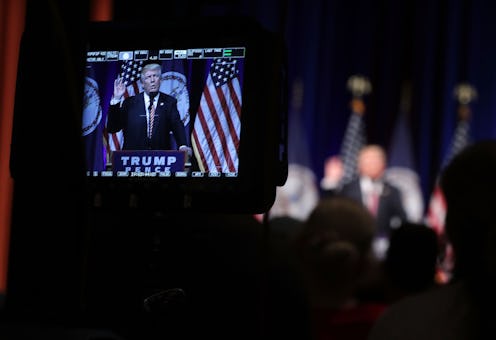News
RNC Has Good Reason To Fear Calls To Monitor Polls
As Republican nominee Donald Trump ramped up calls for supporters to monitor the polls for evidence of voter fraud on Election Day, the Republican National Committee advised its members to refrain from participating in any such measures. While the RNC wants nothing to do with Trump's calls for watching the polls on Election Day, it's not because they're skeptical of his rigged election claims. The RNC is actually legally banned from participating in poll watching.
Thirty-five years ago, Democrats sued the RNC on allegations that a voter-integrity effort led by longtime Trump campaign adviser Roger Stone in 1981 in New Jersey suppressed and intimidated voters. In 1982, the two political parties agreed to a consent decree which, among other things, banned the RNC from "undertaking any ballot security activities in polling places or election districts where the racial or ethnic composition of such districts is a factor in the decision to conduct, or the actual conduct of, such activities there and where a purpose or significant effect of such activities is to deter qualified voters from voting."
Moved by Trump's repeated calls for a coordinated monitoring of the polls — the Republican nominee is recruiting volunteer Trump Election Observers through his official campaign website — the Democratic National Committee has taken legal action once again. In late October, the DNC asked a federal judge in New Jersey to block the RNC from supporting Trump's efforts to organize poll watching. On Nov. 1, a federal judge ordered the RNC turn over any details regarding plans to organize monitoring the polls as part of that lawsuit.
Just prior to the DNC's suit, the RNC reportedly advised its members "not to engage in 'ballot security' activities" while reminding them of "the restrictions placed on the RNC" in a letter sent out earlier this month on rumors Democrats were planning to take legal action following statements regarding collaborative efforts to organize poll watching from Trump's campaign. "You are encouraged not to engage in ‘ballot security’ activities even in your personal, state party or campaign capacity. If you elect to do so, please be aware that the RNC in no way sanctions your activity," the Wall Street Journal reports RNC general counsel John Ryder wrote.
While the RNC has warned members about violating the consent decree by participating in "ballot security" measures like poll watching, Trump's campaign appears to have gotten the message a little too late to keep the RNC out of hot water. Republican vice presidential candidate Mike Pence told supporters in Colorado on Aug. 3 that "the Trump Campaign and the Republican National Committee are working very, very closely with state governments and secretaries of state all over the country to ensure ballot integrity."
News of the DNC's legal action, however, caused Pence to change his tune. He reportedly told RNC lawyer John Phillippe earlier this week that his initial statement had been made "based on his incorrect assumptions" and that he has "no basis to believe that the RNC is working with the Trump campaign on such efforts," according to Politico.
Pence isn't the only member of Trump's camp to claim the campaign was working with the RNC to monitor polls. Following the third presidential debate on Oct. 19, Trump campaign manager Kellyanne Conway reportedly told Bob Costa of the Washington Post that she was "actively working with the national committee, the official party, and campaign lawyers to monitor precincts around the country." However, Conway also later clarified her statement, telling the Post she had been mistaken about the RNC's involvement, Talking Points Memo reported.
While the RNC is clearly anxious about appearing to be in cahoots with the Trump campaign regarding election monitoring efforts, it's sometimes hard to see where the GOP nominee's campaign ends and state parties and the RNC begin given all parties' reliance on RNC infrastructure and resources. For the RNC, the risk is huge. While the ban on ballot security measures as established under the 1982 federal consent decree is set to expire in 2017, it could be extended following recent allegations.
Image: donaldjtrump.com
